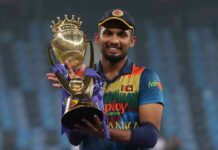Asanka Gurusinha’s bright career was brought to an abrupt end on this day 18 years ago. Gurusinha had just turned 30 when he opted to prematurely retire from international cricket after a run-in with the Sri Lankan administration.
A brilliant player, captain in the waiting and a team man, Gurusinha would have achieved much more for his country had he continued. Sadly, he was gone eight months after Sri Lanka’s World Cup triumph in 1996.
Gurusinha was 19 when he made his Test debut in Karachi as a wicketkeeper batsman after Amal Silva was dropped. For 11 years, the technically sound Gurusinha was the rock of the Sri Lankan middle order. Soon after his debut, Gurusinha’s role in the team changed. He was told to give up wicket keeping duties and provide stability to a side filled with stroke players. He carried that role perfectly by occupying the number three slot. He earned the admiration of his peers and the respect of opponents.
When Sri Lanka’s World Cup triumph in 1996 is spoken of, the names of Aravinda de Silva, Sanath Jayasuriya and Arjuna Ranatunga come to mind. Gurusinha was equally effective. He accumulated 307 runs in six innings including a crucial fifty in the final against Australia. For his teammates, Gurusinha is the unsung hero of Sri Lanka’s World Cup triumph.
Skipper Arjuna Ranatunga remembers his contributions fondly. “Asanka was one of the hardest hitters of the cricket ball that I have come across. People talk of Sanath and Kalu being able to hit the cricket ball out of the park. I tell you what, they should see Asanka in full flow. He was one of the cleanest strikers of the ball,” Ranatunga told gocricket.com.
“During the World Cup campaign in 1996, people enjoyed our attacking style. Asanka played the opposite role. He was the accumulator. He didn’t like it actually. The fans gave him a hard time because they wanted to see shots being played. Once, he urged the team management to take the misery away from him and let him play his game. But we said that our game plan was for him to steady the ship. He performed an outstanding role to the team. He is the unsung hero of our World Cup campaign,” Ranatunga said.
A team man to the core, Gurusinha made 65 in the World Cup final. Sri Lanka had lost the openers cheaply and together with Man of the Match Aravinda de Silva, he added 125 runs for the third wicket, a stand that helped Sri Lanka regain the initiative. During that famous run chase in Lahore, the pressure was mounting on the Sri Lankans to improve their run rate. De Silva volunteered to take on Shane Warne, but Gurusinha wisely reminded him the need for the team’s best batsman to remain till the end.
“Gura was a super guy. He played some crucial knocks, especially in the final. We reached a stage where we had to accelerate. I asked him whether I should take a risk or two. But he wanted me to hang in there and took 12 runs from a Warne over that followed. That was crucial,” de Silva recalled.
Gurusinha’s finest hour in Test cricket came at MCG in 1995. Sri Lanka were bowled out for 307 but he scored 143, batting for seven minutes short of six hours against an attack that had Glenn McGrath, Warne, Craig McDermott and Paul Reiffel. Gurusinha excelled away from home. Five of his seven Test hundreds were scored overseas while both his ODI centuries also came away from home.
After the World Cup, he went to Melbourne to play club cricket as player-cum-coach. The Sri Lankan board requested him to return home to play a domestic tournament. Authorities pointed out that inability to play a minimum number of domestic games would make him ineligible to represent the country.
Gurusinha disagreed. He felt that the rule needed to be applied for all players who were playing overseas. The Sri Lankan board, however, made an exception for county cricket in England. The impasse continued and the end result was one of the brightest talents was lost for the country.
Gurusinha went onto make Melbourne his new home and started a career in marketing. A few months after his retirement, the Sri Lankan board introduced highly lucrative contracts and match fees for players. Sadly, he retired just before playing cricket became a well-paid job. His contributions aren’t well recognized and Gurusinha remains the unsung hero of Sri Lanka’s World Cup triumph.























